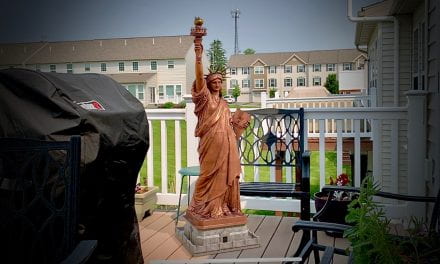A wall of confidence

ROB PEELER
MAY 23, 2017
One interesting piece of the multi-rater exercise that we participated in a few weeks ago is that 99% of my results showed that I’m much harder on myself than what others think. These results did not surprise me.
Recently, I’ve been wondering why I always tend to be harder on myself. When I taught courses or when I give presentations, I’m even harder on myself when I feel that I’m not hitting 100%. In fact, when I taught classes I would film myself to see where I could improve. However, I couldn’t watch video afterward. Not because I did’t like seeing myself on video, but because I nit-picked everything. I remember one video I watched of myself I was appalled by my shirt as I felt there were too many wrinkles in it. I doubt anyone noticed as I seemed to be the only one who commented on such a thing.
My point is that I tend to be self-critical and believe that if you’re going to do something, do it right the first time. This philosophy works in many aspects of my life (i.e., following directions to build furniture or setting up home automation), but not all aspects. I understand that learning from mistakes is important as I have made many mistakes. But. my epiphany is that as long as others don’t see these mistakes, I can make them and learn from them. But as soon as others are involved, I feel the need to be perfect. Hence, me being extremely self-critical in public facing (teaching, presenting, etc.) situations.
I think a big part of this comes from me being deathly afraid of public speaking as a child. It wasn’t until my final years of college when I finally felt comfortable speaking in front of a room. I naturally lean towards being an introvert and the way I found comfortable speaking in public is to build a wall of confidence to surround myself and with that comes this idea of needing to be perfect to maintain that wall. It works for me, but there are downsides.
People I interact with socially tend to find me a bit, I don’t want to say cold, but not interested. This isn’t the case, as I do enjoy others company. But keeping that confidence wall up and being an extrovert at work takes a lot of energy. So, I tend to close up when out socially and gives off the perception of me not wanting to interact. So what does this all have to do with leadership?
Well, I think putting this all out in words is a good reminder for me try to be a bit more balanced and honest with myself and others. On the positive side, I think being who I am is important and it helps me remember that what people have on the outside isn’t necessarily what’s on the inside. Give friends, family, and employees the benefit of the doubt as they too might just need to recharge.





Rob, I appreciate your honesty in this post! I can relate as a person who is introverted and truly needs to recharge after socializing. In my experience, I have noticed that being highly critical and introversion usually go hand-in-hand. Highly critical people are not only critical of others, but like you said, especially critical of themselves. I wonder if this heightened criticism lends to introverted tendencies because of a perceived criticism from others? It’s less energizing and more exhausting to navigate social situations when we perceive critique at every turn. When I was training to be a counselor, I received the feedback that I’m highly critical, and when I asked what to do about it to “turn the critical voice in my head down,” my instructor said: “you can’t, you just need to have really critical friends.” I truly believe that there is a cultural difference between people based on how they gain their energy (introversion vs. extroversion) and as you have indicated in your post, it leads to miscommunication and misunderstandings!